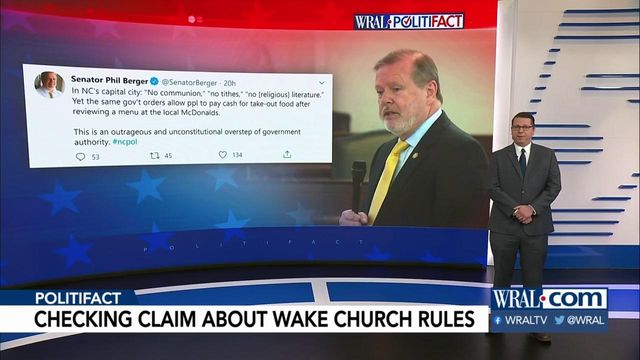Is Wake County blocking communion and tithes while allowing food take-out?
The Wake County Board of Commissioners on Thursday updated its stay-at-home order. North Carolina state Sen. Phil Berger said that there's "no communion ... tithes ... or literature" allowed. "Yet the same (government) orders allow (people) to pay cash for take-out food after reviewing a menu at the local McDonalds,"
Posted — UpdatedNorth Carolina reached 6,000 cases of the novel coronavirus this week, so it’s no surprise that some local governments are updating their travel restrictions.
But Thursday, state Sen. Phil Berger certainly seemed surprised by new restrictions in North Carolina’s capital city. Berger, the Republican Senate leader, tweeted that he was outraged by local limitations on religious services.
“In NC's capital city: ‘No communion,’ ‘no tithes,’ ‘no [religious] literature.’ Yet the same (government) orders allow (people) to pay cash for take-out food after reviewing a menu at the local McDonalds,” he tweeted on April 16, adding: “This is an outrageous and unconstitutional overstep of government authority.”
For this fact check, PolitiFact isn’t going to rule on the Constitutionality of the order or issue a rating. Instead, we’re going to look at what the local stay-at-home order actually says.
Did Raleigh, the city where the legislature is located, actually ban communion, tithes and religious literature? And did they institute those bans while allowing drive-thru restaurants and their customers to exchange cash?
First, we need to clarify who issued the order. It was the Board of Commissioners for Wake County, where Raleigh is located. While the board technically only has oversight over non-incorporated areas of the county, elected leaders from local municipalities have signed on to the order. That includes Raleigh.
Now, let’s look at what the county’s order says about religious services.
Communion, literature, tithing
Berger’s tweet is vague and could give the impression that none of those worship staples are allowed at all. But that’s not true.
Wake County’s order only addresses the hand-to-hand sharing of communion, tithes and religious literature. The order also loosens a previous ban on church gatherings, as WRAL has reported. Churches are now allowed to hold “drive-in” worship services, where people gather in their cars.
Here’s what the order says about faith institutions and organizations: “The following contact activities are strictly prohibited: handing out literature during the service, distributing communion elements, and personal collection of tithes/offerings.”
People can still consume communion elements brought from home or the store, consult personal worship materials and donate money to worship groups online or through other means that don’t involve physically passing money.
Dara Demi, a spokeswoman for Wake County, clarified to the News & Observer newspaper that people can also tithe by driving by a collection plate and dropping the money in.
Restaurant interactions
Now let’s look at the second part of Berger’s tweet. He said Wake’s order allows people “to pay cash for take-out food after reviewing a menu at the local McDonald’s.”
The point of the tweet, Berger’s office said, is that food and pieces of paper (either cash or a menu) is allowed to change hands at restaurants but not churches. And, generally speaking, that’s true.
PolitiFact reached out to Wake County about the rules. Through spokeswoman Kelly Owens, Wake County attorneys released a statement. It says: “The First Amendment to Proclamation of Emergency Restrictions was drafted with input from public health officials while balancing the scale of risk associated with each activity,” Wake’s statement reads.
Of course, eateries are governed by health regulations in a way that churches aren’t.
Still, Jeanette Doran, president of the North Carolina Institute for Constitutional Law, thinks the rules could run afoul of North Carolina’s state Constitution. When it comes to religious liberty, the NC Constitution says, no authority can interfere with “the rights of conscience.”
“I can go to a coffee shop and hand over my money or credit card, but I couldn’t put my money in the offertory if I go to mass,” she said.
The ACLU of North Carolina isn’t sure the case is clear-cut. Citlaly Mora, a spokesperson for ACLU NC, noted that courts often look at burdens imposed by a restriction. So in Wake’s case, the court might weigh the burden imposed on churches to not collect tithes in-person against the government's interest in public health.
Our conclusion
Berger tweeted “In NC's capital city: ‘No communion,’ ‘no tithes,’ ‘no [religious] literature.’ Yet the same (government) orders allow (people) to pay cash for take-out food after reviewing a menu at the local McDonalds.”
The tweet could give someone the impression that Wake County has banned tithing, communion and the distribution of religious materials altogether. That’s not the case. (Berger also overlooked the fact that the county is now allowing drive-in church services.)
Berger’s broader point was that, when it comes to physically exchanging food and money, county officials are treating churches and restaurants differently. That’s generally accurate.
Related Topics
• Credits
Copyright 2024 by Capitol Broadcasting Company. All rights reserved. This material may not be published, broadcast, rewritten or redistributed.





